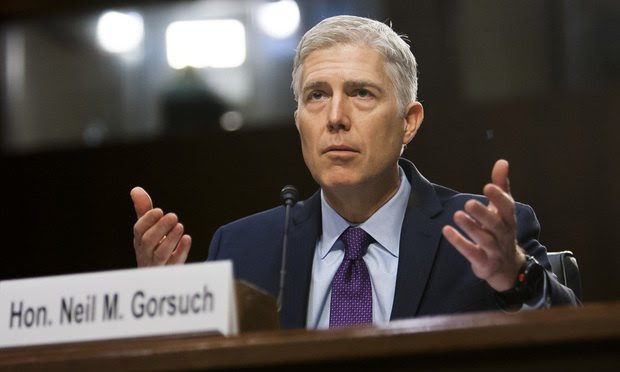Timing Is Key in Copyright Case | Gorsuch-Sotomayor Team Up (Again) | More on 'Serial Adversaries'
Our snapshot on the lawyers arguing today's big copyright case at the US Supreme Court, plus: observations on the Gorsuch-Sotomayor alignment in a Sixth Amendment dispute, and more on "serial adversaries" at the high court. Thanks for reading Supreme Court Brief!
January 08, 2019 at 07:00 AM
8 minute read
Welcome back to Supreme Court Brief, where we've got a rundown of the advocates arguing today's big copyright case, and scroll down for some observations on Monday's pairing—the latest—of justices Neil Gorsuch and Sonia Sotomayor. And more on our “serial adversaries” report from earlier this week. Plus: a former Roberts clerk defends the Texas declaratory ruling against the Affordable Care Act. Thanks for reading SCB. Feedback and tips welcome at [email protected] and [email protected].

Timing Is Key in Copyright Case
The issue at stake in today's argument in Fourth Estate Public Benefit Corporation v. Wall-Street.com sounds pretty clerical: At what point during the process for registering a copyright can the owner sue for infringement? Should it be when the owner first applies for a copyright, or only when the Copyright Office acts on the application?
But judging from the amicus briefing, how the court answers the question is life or death for copyright holders like authors and musicians. If the high court agrees with the U.S. Court of Appeals for the Eleventh Circuit that litigation has to wait for the copyright to be acted on—registered or refused—it would have “a devastating effect,” according to Covington & Burling partner Beth Brinkmann.
Brinkmann wrote an amicus brief for leading music organizations. Given the limited staff and funding for the Copyright Office, Brinkmann explained, it can take months or years for musicians to have their creations copyrighted—sometimes beyond the three-year window for infringement claims to be made.
Arguing against the Eleventh Circuit ruling will be Aaron Panner of Kellogg, Hansen, Todd, Figel and Frederick, and a former clerk to Justice Stephen Breyer. Arguing for the longer timeframe is Peter Stris of Stris & Maher, joined by associate to the U.S. solicitor general Jonathan Ellis, a former clerk to Chief Justice John Roberts Jr.
Some pre-argument analysis from IP experts:
>> Irene Lee, partner at Russ August & Kabat: “In general, securing a registration certificate provides some level of clarity in litigation which is inherently unpredictable and subject to uncertainties. Imagine the confusion that could arise when a deposited work is deemed unregistrable in the middle of an infringement case.”
>> Robert deBrauwere, partner at Pryor Cashman: “There is no doubt that the practical impact of the issue before the court is not as dry as it may sound … The court's decision will have a very significant impact on the ability to secure, and the efficacy of, injunctive relief, as well as the possible scope of damages available to copyright litigants, and even whether a remedy may be available at all.”
>> Laura Goldbard George, partner at Stroock & Stroock & Lavan: “There is significant disagreement as to which approach is the correct approach … Even the leading copyright treatise authors advocate different approaches—Nimmer & Nimmer propose a variant of the application approach, and Patry advocates for the registration approach.”

Gorsuch, Sotomayor Align Again
Justices Clarence Thomas, Neil Gorsuch and Brett Kavanaugh have publicly donned the mantle of “originalists.” But in Monday's per curiam opinion involving the Sixth Amendment, only Gorsuch followed through with an originalist interpretation and once again found unusual common ground with the left's non-originalist Justice Sonia Sotomayor. The court denied review in the case Hester v. United States. John Hester argued that the justices' precedents requiring prosecutors to prove to juries all of the facts on which a sentence of imprisonment is based requires juries to find the facts supporting a restitution order. (Bloomberg Law has more on the case here.)
Dissenting from the denial of review, Gorsuch, joined by Sotomayor, said the government's arguments were difficult to reconcile with the Constitution's original meaning. The Sixth Amendment, he said, was understood to preserve the jury's role at common law. Gorsuch wrote on Monday:
“And as long ago as the time of Henry VIII, an English statute entitling victims to the restitution of stolen goods allowed courts to order the return only of those goods mentioned in the indictment and found stolen by a jury. In America, too, courts held that in prosecutions for larceny, the jury usually had to find the value of the stolen property before restitution to the victim could be ordered. And it's hard to see why the right to a jury trial should mean less to the people today than it did to those at the time of the Sixth and Seventh Amendments' adoption.”
Reinvigorating the role of the jury was a cause championed by the late originalist, Justice Antonin Scalia. Gorsuch and Sotomayor in November teamed up on another Scalia passion—the Sixth Amendment's confrontation clause. Gorsuch, joined by Sotomayor, dissented from a denial of review in an Alabama drunk-driving case.
What to make of the latest Gorsuch-Sotomayor alliance? Sentencing scholar Doug Berman of Ohio State University Moritz College of Law suggested in a blog write-up on Monday's order:
“Supposed SCOTUS originalists like Chief Justice Roberts and Justices Thomas and Kavanaugh apparently do not want to here follow originalist principles to what would appear to be their logical conclusion. Supposed SCOTUS liberals like Justices Ginsburg and Kagan do not want to here protect a certain type of right of a certain type of criminal defendant.”
And Sotomayor? Berman said she “never shrinks from following constitutional rights wherever she thinks they must extend.”

Serial Adversaries… Continued
Yesterday we reported on Daniel Geyser and Kannon Shanmugam, who were arguing at the Supreme Court against each other for the fourth time in two years. We put out a call for additional “serial adversaries,” and quickly were pointed to former solicitors general Paul Clement and Donald Verrilli Jr. By our calculation, the two have argued against each other nine times since 2002 (and on the same side only once) in their varying capacities as SG or private practitioner. Some have been landmark cases, like United States v. Windsor in 2012 and National Federation of Independent Business v. Sebelius in 2011.
Clement, now partner at Kirkland & Ellis, said this of Verrilli, partner at Munger, Tolles & Olson: “I have had the privilege of arguing with and against Don, and it is always a pleasure. He is a terrific advocate and a consummate professional.”
Incidentally, in preparing Monday's report, a comment by Shanmugam praising Geyser got lost in the Internet pipes, much to our regret. Here it is, hopefully better late than never: “I'd say Dan is a rising star, but his star has now been risen for some time. And I'd say I'm looking forward to arguing against Dan again, but I'd look forward to it more if he weren't so good at what he does. He is an outstanding lawyer and, more importantly, a wonderful person.”

SCOTUS Headlines: What We're Reading
>> “While the latest ACA ruling has prompted strong reactions from both the right and left, there is an underlying, easy-to-miss point about judicial remedial power. Regardless of one's view on the merits, the district court decision is a model of restraint in an important, structural way. The judge did not enjoin the ACA from coast to coast,” writes Erin Hawley, an associate professor of law at the University of Missouri and former clerk to Chief Justice John Roberts. [NLJ]
>> “The U.S. Supreme Court on Monday cleared the way for the attorney general of Massachusetts to obtain records from Exxon Mobil Corp to probe whether the oil company for decades concealed its knowledge of the role fossil fuels play in climate change.” [Reuters]
>> “With Emulex now on the Supreme Court's docket, it's going to be really, really interesting to see what the Trump administration has to say about shareholders' right to bring these Section 14 class actions.” [Reuters]
>> “He disparaged the police on Facebook. So they arrested him.” The New York Times spotlights a libel case from New Hampshire, where a man who called a police officer a “dirty cop”—after receiving a traffic citation—has more legal issues to confront. [NYT]
>> For the first time in her 25 years on the U.S. Supreme Court, Justice Ruth Bader Ginsburg was not on the bench for an oral argument, as she recuperates from lung cancer surgery. [NLJ]
This content has been archived. It is available through our partners, LexisNexis® and Bloomberg Law.
To view this content, please continue to their sites.
Not a Lexis Subscriber?
Subscribe Now
Not a Bloomberg Law Subscriber?
Subscribe Now
NOT FOR REPRINT
© 2025 ALM Global, LLC, All Rights Reserved. Request academic re-use from www.copyright.com. All other uses, submit a request to [email protected]. For more information visit Asset & Logo Licensing.
You Might Like
View All
Court Overturns $185M Fee Award for Quinn Emanuel in ACA Litigation

The Supreme Court Leaker That Never Was | This Term's 1st Opinion | Attorney-Client Privilege
9 minute read
Who's Arguing at the Lectern | Union-Busted Cement Trucks | Emergency Application Catch Up
9 minute read
Is It Legal Advice or Business Advice? | What Chief Justice John Roberts Didn't Say
Trending Stories
Who Got The Work
J. Brugh Lower of Gibbons has entered an appearance for industrial equipment supplier Devco Corporation in a pending trademark infringement lawsuit. The suit, accusing the defendant of selling knock-off Graco products, was filed Dec. 18 in New Jersey District Court by Rivkin Radler on behalf of Graco Inc. and Graco Minnesota. The case, assigned to U.S. District Judge Zahid N. Quraishi, is 3:24-cv-11294, Graco Inc. et al v. Devco Corporation.
Who Got The Work
Rebecca Maller-Stein and Kent A. Yalowitz of Arnold & Porter Kaye Scholer have entered their appearances for Hanaco Venture Capital and its executives, Lior Prosor and David Frankel, in a pending securities lawsuit. The action, filed on Dec. 24 in New York Southern District Court by Zell, Aron & Co. on behalf of Goldeneye Advisors, accuses the defendants of negligently and fraudulently managing the plaintiff's $1 million investment. The case, assigned to U.S. District Judge Vernon S. Broderick, is 1:24-cv-09918, Goldeneye Advisors, LLC v. Hanaco Venture Capital, Ltd. et al.
Who Got The Work
Attorneys from A&O Shearman has stepped in as defense counsel for Toronto-Dominion Bank and other defendants in a pending securities class action. The suit, filed Dec. 11 in New York Southern District Court by Bleichmar Fonti & Auld, accuses the defendants of concealing the bank's 'pervasive' deficiencies in regards to its compliance with the Bank Secrecy Act and the quality of its anti-money laundering controls. The case, assigned to U.S. District Judge Arun Subramanian, is 1:24-cv-09445, Gonzalez v. The Toronto-Dominion Bank et al.
Who Got The Work
Crown Castle International, a Pennsylvania company providing shared communications infrastructure, has turned to Luke D. Wolf of Gordon Rees Scully Mansukhani to fend off a pending breach-of-contract lawsuit. The court action, filed Nov. 25 in Michigan Eastern District Court by Hooper Hathaway PC on behalf of The Town Residences LLC, accuses Crown Castle of failing to transfer approximately $30,000 in utility payments from T-Mobile in breach of a roof-top lease and assignment agreement. The case, assigned to U.S. District Judge Susan K. Declercq, is 2:24-cv-13131, The Town Residences LLC v. T-Mobile US, Inc. et al.
Who Got The Work
Wilfred P. Coronato and Daniel M. Schwartz of McCarter & English have stepped in as defense counsel to Electrolux Home Products Inc. in a pending product liability lawsuit. The court action, filed Nov. 26 in New York Eastern District Court by Poulos Lopiccolo PC and Nagel Rice LLP on behalf of David Stern, alleges that the defendant's refrigerators’ drawers and shelving repeatedly break and fall apart within months after purchase. The case, assigned to U.S. District Judge Joan M. Azrack, is 2:24-cv-08204, Stern v. Electrolux Home Products, Inc.
Featured Firms
Law Offices of Gary Martin Hays & Associates, P.C.
(470) 294-1674
Law Offices of Mark E. Salomone
(857) 444-6468
Smith & Hassler
(713) 739-1250






